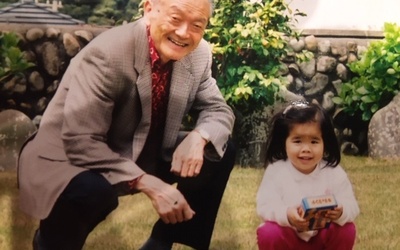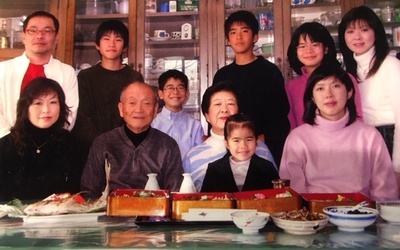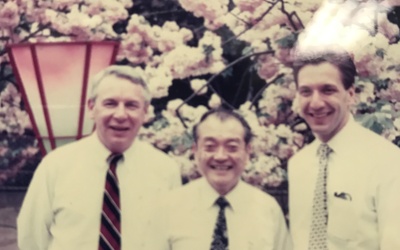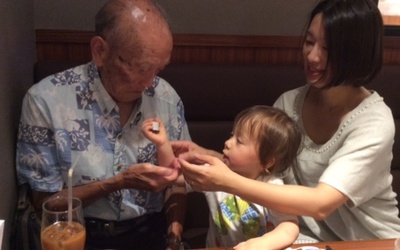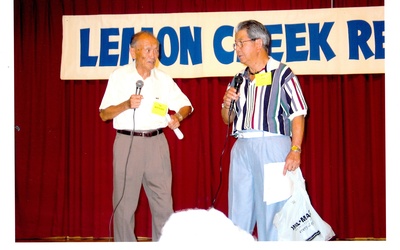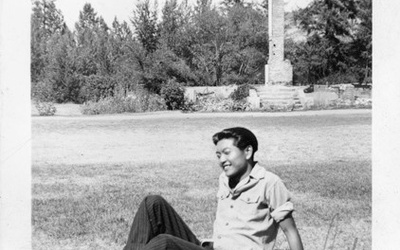A Japanese Canadian Teenage Exile: The Life History of Takeshi (Tak) Matsuba
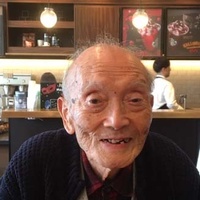
This series tells the life history of Takeshi (‘Tak’) Matsuba, a second-generation Japanese Canadian born in Vancouver to immigrants from Wakayama. It narrates his memories of his childhood and teen years until the beginning of World War II, the subsequent forced uprooting of his family from their home and the dispossession of their family business and all their property, their incarceration in the Lemon Creek internment camp, and their exile to Japan at the end of the war.
Next it describes his life in postwar Japan, particularly his employment with the American Occupying Forces and then his career with various companies in the private sector. It also deals with his participation in starting and leading the Kansai chapter of an association of Japanese Canadian exiles and his life since retirement. In the process of gathering data for this research, it was discovered that Tak has a real knack for reminiscing in a humorous and catchy way, so large portions of the narrative are told in Tak’s own words in order to keep their original flavor.
Tak Matsuba passed away on May 11, 2020
* This series is an abridged version of a paper titled, “A Japanese Canadian Teenage Exile: The Life History of Takeshi (Tak) Matsuba,” published in Language and Culture: The Journal of the Institute for Language and Culture, Konan University, March 2020.
Stories from this series
Part 7: Formation of JC Exiles Group in Kansai, Life after Retirement
April 20, 2020 • Stanley Kirk
Involvement in forming and leading the JC Exiles Group in Kansai Following the official apology in 1988 by the prime minister of Canada to Japanese Canadians, a delegation was sent by the Canadian government to Japan to explain the terms of redress to the Japanese Canadian exiles still living there. These explanation meetings brought together many exiles who had not seen each other since the internment. Tak says that they had some idea of others who had been deported to …
Part 6: Career in the Private Sector - Santai Trading Company & Fujicopian
April 13, 2020 • Stanley Kirk
Employment with Santai Trading Company After seven years with Sogo, in 1959 Tak moved to the textile export division of a medium sized trading company called Santai Trading Company. He would stay there until 1977. As he explains, this job involved a wide variety of business endeavors and interesting experiences. While working in Tokyo at Amerex Trading Co., I had met many Japanese businessmen and one of them became a director of the department store. He was also president of …
Part 5: Career in the Private Sector - Amerex & Sogo Department Store
April 6, 2020 • Stanley Kirk
Employment with Amerex As the Japanese economy began to re-emerge during the postwar years, there was an urgent need for employees who could speak English well. This became a lifesaving economic opportunity for many of the exiles, even those lacking a strong formal education. Tak was one of those who made the best of this situation, using a combination of native wit, natural curiosity, good social skills, network building, and a willingness to offer his assistance to anyone who needed …
Part 4: Employment with the US Occupation Forces
March 30, 2020 • Stanley Kirk
Soon after moving to Japan Tak found work with the US occupation forces. While it included room and board, the salary itself was rather low and was frozen by law at about 1500 yen per month, of which he was only permitted to withdraw 500 yen per month while the remainder was kept in the bank. Yet, he was able to send some money each month to support his parents and siblings. Officially, his main work was to keep statistical …
Part 3: Exile of the Matsuba Family to Japan
March 23, 2020 • Stanley Kirk
Tak was 19 when his family was exiled from Canada to Japan. There were various reasons why his parents chose exile to Japan over dispersal to eastern Canada. One was uncertainty about what would happen if they chose the latter. They were also concerned about the welfare of close relatives in Japan with whom they had lost contact during the war. Another factor was that his father still owned a house in Miomura whereas in Canada he had lost everything. …
Part 2: Life in the Lemon Creek Internment Camp
March 16, 2020 • Stanley Kirk
Tak vividly remembers hearing the news of the bombing of Pearl Harbor. “It was a Sunday and I was with friends out on Powell Street on our way home from playing badminton at the Japanese Language School when we heard the news from a radio in a parked car. It had a very sobering effect on all of us.”1 The order for Japanese Canadians on the west coast to leave their homes and property soon followed. Tak vaguely remembers that …

